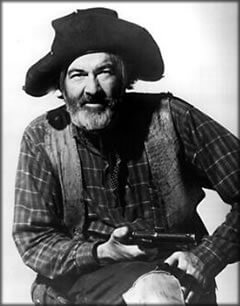Tuckered out
What's the meaning of the phrase 'Tuckered out'?
Exhausted.
What's the origin of the phrase 'Tuckered out'?
It will come as no surprise that 'tuckered out' is an American phrase. No 'B-feature' western from the 1930s and 1940s was complete without Gabby Hayes being 'plumb tuckered out'.
 Hayes' contribution to the genre was celebrated by Mel Brooks in the 1974 film Blazing Saddles. In that, a look-alike actor played the part of Gabby Johnson, spouting 'authentic frontier gibberish' - "dad gum it, I am gonna die here an' no sidewindin bushwackin, hornswaglin, cracker croaker is gonna rouin me biscuit cutter".
Hayes' contribution to the genre was celebrated by Mel Brooks in the 1974 film Blazing Saddles. In that, a look-alike actor played the part of Gabby Johnson, spouting 'authentic frontier gibberish' - "dad gum it, I am gonna die here an' no sidewindin bushwackin, hornswaglin, cracker croaker is gonna rouin me biscuit cutter".
'Plumb' is just an intensifier. 'Tuckered out' is rarely seen alone. People are 'plumb', 'clear', 'well-nigh' or, as in the earliest example that I've found, 'prodigiously', 'tuckered out'. That example is from the Wisconsin Enquirer, April 1839:
"I reckoned to have got to the tavern by sundown, but I haven't - as I'm prodigiously tuckered out."
'Plumb tuckered out' is somewhat later and the first example I have is from The Atlantic Monthly, November 1871, in a story called Wayside Pikes:
She then informed me that the first time she had mounted the colt he had nearly bucked her to pieces; he had jumped and jounced till she was plum tuckered out before he had given up.
That piece uses the 'plum tuckered out' spelling rather than 'plumb tuckered out'. 'Plumb' is the correct spelling but the incorrect version is still found - rather inexplicably, as 'plumb' means 'completely; absolutely; quite', whereas a 'plum' is an edible fruit.
'Tuckered out' is often applied to children. There doesn't however seem to be a link to 'Tommy Tucker', that member of the 'little' club of nursery rhyme characters - 'Little Bo-Peep', 'Little Boy Blue', 'Little Jack Horner' and 'Little Miss Muffet'. 'Little Tommy Tucker' may not have been very big and he sang for his supper, but there's no mention of him being especially tired.
The actual derivation of this phrase is quite prosaic. 'Tucker' is a colloquial New England word, coined in the early 19th century, meaning 'become weary' and which ultimately derives from the Old English verb 'tuck', meaning 'punish; torment'.
See other phrases that were coined in the USA.

